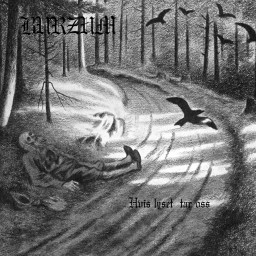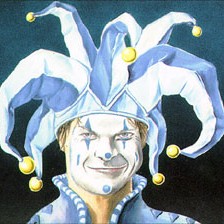Reviews list for Burzum - Hvis lyset tar oss (1994)
The hype surrounding this album has got to have everything to do with the person who created it, and not it's sonic merits. The man who made it is a murderer and Neo-Nazi. If it was not for his involvement in Mayhem, the church burnings, the murder, and so on I don't think anybody would give a genuine shit about this, and if you think I'm trolling, find a review anywhere that is actually a review of the music without a lengthily exposition detailing Vikernes, his ideals, and his history. If I must be forced to endure a Burzum album, at least let it be Filosofem. That album has Dunkelheit, and that's a good song. This album is 45 minutes long. 14 minutes (so nearly a third of it) is just atmospheric keyboards. Wow, so heavy, so metal! Sorry, I'm not buying the mythos. This is shitty music crafted by a shitty human being, and I'm rating it for what it is. Go get your Pitchforks.
Looking at old reviews for albums is a good way to see just how much you've changed. In this instance, it's one of Burzum's crowning gems, the one he wrote right before his legendary (tho overrated IMO) Filosofem. The name is Hvis lyset tar oss, which is Norwegian for "If the Light Takes Us." At this point in time, much like Filosofem, I can't say I like this one as much as I used to. I even knocked off a whole star from my Filosofem rating when I heard it. But I don't think I'll go quite that far. Back then, I liked Filosofem more, by a 2/100 edge (92 vs. 90). This time, I'd say I like this much more than Filosofem, which only had a 93.
In my old review, I mentioned that Burzum expressed his anger perfectly. I really don't think so anymore. Hearing so many professional and even frighteneing shrikes and growls in my time as a metal fan, now Burzum's voice sounds unpolished and even a little dorky, like he's trying either too hard or not hard enough. Otherwise, the music itself is pretty good. I got it right in my older review when I said that Burzum delivers on the basics of atmo-black well enough. This album is cold and treacherous, much like an actual blizzard. There are synths in the back but they're typically faint and not forced, working just well enough to add a little spice to these four epics. But the thing about these epics is that they largely have a one-track mind, so once again, it's more about the atmosphere than the music. Still, it's a careful, though not too experimental, blend of atmo, despressive and traditional black metal with a little dungeon synth on the side.
So I would say in my current state as a music buff that Burzum;s album right before Filosofem has the edge. I didn't really expect to like it more than Filosofem at first, but I'd say that this one feels more like an actual music album, and it doesn't have an overdone 25-minute ambient track at the end, but rather a synth track which feels like something out of a Tangerine Dream album (it has a 14-minute one, which is still overdone but easier on more melodic ears and actually showing clever shifts in gear).
76
Frozen Under Bergen
It's a strange feeling not being a massive Burzum fan, since Vikernes seems to have a knack for releasing quite a few thought provoking albums for people who are willing to dig through the cold Norwegian snow. Those who do survive the winter emerge with novels outlining the intricacies and experiences they had listening to such emotional gripping releases. Sadly, for me, Burzum remains a project that I can say is undoubtedly one of the best of its kind, but it doesn't go emotionally deeper than that. So, let's try a bit of different approach when talking about Mr. Varg Vikernes this time around.
The most important aspect of Hvis Iyset tar oss, as well as the other early Burzum releases, is the creation and sustaining of a certain atmosphere. The common atmosphere for most of these early Atmospheric Black Metal bands was freezing, unrelenting, and wintry cold, which is almost a cop-out explanation at this point. The raw and almost metallic production coupled with simple but bleak sounding synths creates an atmosphere no one has really been able to recreate as effectively, which shows just how important these early albums are for the entire genre. As important as atmosphere is for a genre named after it, no one else can quite capture the raw but reflective nature of Burzum, where each piece of the composition always feels like it's part of the big picture.
The paramount ingredient for Burzum's winning formula is repetition. Repetition. Repetition. Hvis lyset tar oss isn't afraid to bore the listener by repeating the same rhythm or passage over and over again for 7 or even 15 minutes straight. This repetition is presented as a challenge to the listener in a way, since the music itself isn't necessarily boring, it's just extended way past when the listener thinks it should end. "Tomhet" is the obvious example of this formula, as it is a precursor to "Rundgang um die transzendentale Säule der Singularität" off of Filosofem. It creates a trance-like rhythm that has very subtle changes and causes the listener to fill in a lot of the blanks in the music, which I think is one of the most intelligent ways to really sell an atmospheric album.
This review may go hand-in-hand with Filosofem eventually, so I'll cap it off by saying that Hvis lyset tar oss is definitely a separate experience than Filosofem is. The guitars and distortion are pushed back more, Vikernes' voice is just as ragged but more clear, there are more riffs and melodies overall, and the type of atmosphere that is created is much different. It still has some of the darkest and rawest Black Metal riffs out there, but it doesn't relish in its atmosphere as much as Filosofem does. If Filosofem isn't for you but you still want to give Burzum a chance, this is a more musical and normal Atmospheric Black Metal release that still serves as a gold standard for what Atmospheric Black Metal can be, along with Burzum's other early albums.
An atmospheric masterpiece of black metal and one of the truly essential extreme metal albums.
I'm almost daunted at the prospect of trying to describe this album in review format. It plays such a large role in not only my musical development, but my life in general. It's the kind of album where describing individual instruments and performances seems a bit superfluous when the resulting sound transcends anything I could possibly depict with vocabulary alone. Hvis lyset tar oss (which means If the Light Takes Us in Norwegian) is not just mere music to me. It's a journey through mystical, shadowy forests and a hauntingly chilling reminder of humanities darker nature all wrapped up in mesmerising beauty. I know I sound like a madman, but it's so rare that an album can move me to such an extent that my surroundings become inconsequential. I become one with the music, connecting on an intellectual, emotional and physical level. However, just as with the majority of work associated with Kristian Vikernes (or Count Grishnackh as he wished to be known), there’s a story behind Hvis lyset tar oss that’s almost as fascinating as the music itself. It’s one that involves mystery, murder and by the end, a heroine of sorts. Just as with all early Burzum chapters, this one begins at Grieghallen Studio, where our lonesome Count once again works his melancholic magic.
The rate at which Kristian cranked these Burzum tunes out is frightening to say the least. Hvis lyset tar oss was recorded in September 1992, just five months after second album Det som engang var, which itself was recorded just three months after the debut. You’d think cranking out three albums in such a small period of time would result in them all sounding exactly the same, with no real development or improvement. Incredibly that’s not the case at all, with each subsequent release progressing in quality and displaying the sort of growth that normally comes with many years of work. Not only was Kristian recording albums in stupendously quick succession, he was producing each one in next to no time at all. He spent between twenty and thirty hours all up in the studio crafting Hvis lyset tar oss, and that’s including the recording of two tracks that never made the album. While he’d made a habit of recording each instrument in one take on previous albums, and accepting any mistakes that occurred through that technique, this time he was forced to perform the drums for the title track twice after a technical issue spoiled his first attempt. This seeming disregard for performance quality was clearly apparent on the first two albums with obvious slip-ups found on the final products, but Kristian seems to have nailed each and every section of this third full length, which is admirable given the lengthy, multifaceted compositions.
If you’re wondering what happened to the two tracks I mentioned earlier, Kristian has been quite open about the reasons they were left off Hvis Lyset Tar Oss. One of them was actually an early version of Dunkelheit (Darkness), which would eventually be re-recorded in brilliant form for the Filosofem album. He was never happy with this version and knew as soon as he finished recording it that it was not going to make the final record this time round. The second track was called Et hvitt lys over skogen (A White Light Over the Forest), which was actually part of the promotional copies that were sent around to fanzines. I can only assume the response was negative as this track was replaced by Tomhet, which was not originally going to be included on Hvis lyset tar oss, prior to release. For anyone interested to hear what the fourth track could have been, you can find Et hvitt lys over skogen on the 2002 bootleg compilation called Anthology (not to be confused with the 2008 compilation of the same name). It’s by no means a terrible track, but it does lack the energy and passion that the other three black metal tracks emanate. There are some very simplistic riffs that are almost folk metal in their tone and the drumming is noticeably lacklustre. The choice to replace it with Tomhet was a good one, not only due to the quality, but also to improve the flow of the album that is given an effective ambient comedown.
With the album recorded, this is where the Burzum story, and the life of Kristian Vikernes, gets complicated! Not only had Kristian not yet released second album Det som engang var at the time of recording third album Hvis lyset tar oss, he would also record fourth album Filosofem before August 1993 when Det som engang var would finally be released on his own Cymophane label. One can assume that Kristian would have gone on to release both Hvis lyset tar oss and Filosofem on Cymophane in quick succession given the chance, but his choices outside of music meant that this would never be possible. In January 1993, Kristian had taken part in an interview with a local newspaper where he says he made blatant exaggerations on numerous topics in an attempt to get more sales for Øystein Aarseth’s (aka Euronymous) Deathlike Silence label. The journalist reported him to the police and he was arrested and held for a week, with the subsequent media blitz scaring Øystein into closing him shop. Kristian was angry that he didn’t take advantage of the attention the interview had created for him and for not paying back money that was owed for the earlier Burzum releases. He was also bitterly disappointed that his anonymity (under the name Count Grishnackh) had been destroyed, with his real name used in the newspapers. He officially changed his name to Varg (which means Wolf) Vikernes and stopped using the pseudonym altogether.
The falling out between Øystein and Varg escalated, and while I won’t go into too much detail due to only Varg’s side of the story being available for obvious reasons, the end result was that Varg murdered Øystein on the 10th of August 1993. Varg claims that he was simply defending himself as it was Øystein that planned to torture and kill him in the first instance, but the jury was not convinced that the twenty-three stab wounds were not premeditated. The arson of several churches was also linked to Varg during the investigation and he was given a full sentence of twenty-one years in prison, consequently ending any possibility of more Burzum material being recorded, let alone the ones already recorded being released. Varg attempted to continue running Cymophane and the relevant worldwide distribution from within prison, but he soon realised that it was going to be impossible to get Hvis lyset tar oss and Filosofem released without the help of a record company. Unsurpisingly given the negativity directed at Varg’s recent actions, no companies were willing to deal with him, and it seemed his work would remain unknown to the world at large. Enter our heroine Tiziana Stupia. Being a huge fan of Burzum, she was more than a little disappointed to hear that there were two unreleased albums gathering dust, and took it upon herself to make sure they didn’t stay that way. After trying unsuccessfully to convince several companies to release them, Stupia decided to do it herself.
After Varg signed a contract giving Stupia rights to distribute all Burzum material, Misanthropy Records was formed in 1993. There was never any intention to continue the label in any other shape or form, but the success of Hvis lyset tar oss and the re-releases of Burzum/Aske and Det som engang var convinced her to sign up other unique black metal bands. When you take a look at the first three non-Burzum releases on Misanthropy, it’s easy to see that Stupia had a fantastic ear for quality and enthralling black metal bands. In the Woods’ Heart of the Ages, Fleurety’s Min tid skal komme and Ved Buens Ende’s Written in Waters are all incredible albums that helped transform black metal into a much broader and experimental genre. Further releases from bands like Monumentum, Primordial and ironically Mayhem (given Euronymous’ involvement with the band) brought more success and Misanthropy Records continued right through to the year 2000, when Stupia closed the company to concentrate on her career as a pagan priestess. There are obviously numerous reasons to be grateful to Tiziana Stupia, but none more important than Hvis lyset tar oss. Released on May the 4th 1994, the album came with one of the most stunning atmospheric black metal covers imaginable, being Fattigmannen (The Pauper) by nineteenth century Norwegian artist Theodor Kittelsen. After the more Advanced Dungeons and Dragons inspired artwork of Burzum and Det som engang var, this new visual direction was far more moving and appropriate.
Hvis lyset tar oss only contains four tracks, but considering it has a total running time of around forty-five minutes, one can't really hold that against it. As great as the album is as a whole, and it is truly astonishing, it’s opener Det som en gang var (What Once Was) that really makes it so special. Not only is it the highlight of Hvis lyset tar oss, it's also considered by many (myself included) to be the greatest single black metal piece of music in existence. The introductory build up of symphonic and distorted elements is entirely captivating and the eventual payoff monumental. There’s no sign of drums until the three minute mark and no sign of vocals for a further two, yet each addition brings with it a whole new level of atmosphere and almost overwhelming emotional weight. The keyboards alone contain a sort of grand, epic quality that isn’t remotely cheesy or overindulgent, playing a layered landscape supporting role that really brings the best out of the accompanying black metal. It’s the first real example of Varg integrating the symphonic aspect to such a degree and an unquestionably breathtaking success. While someone not affiliated with black metal may find them horrifying, Varg's tortured shrieks are affecting and chilling. Those agonizing screams around the twelve minute mark in particular raise the hair on the back of my neck every time they arrive. Det som en gang var is worth the price of admission alone, but thankfully this album has so much more to offer.
The second and third tracks are not as epic as the first, but they are no less genius. Neither Hvis lyset tar oss (If the Light Takes Us) nor Inn i slottet fra drømmen (Into the Castle From the Dream) rely on keyboard backdrops and instead focus on traditionally cold, gripping black metal riffs. Each has a running time of around eight minutes and once again utilise hypnotic repetition with small changes at regular intervals to induce a sort of trance-like state in the listener. It’s a technique that Varg had been developing with each album but had never completely nailed until this release. Both tracks are high on intensity with fast drumming and a propensity for double bass kicking. The title track is very guitar driven with several magnificent and exceptionally dark riffs that make up some of the more menacing moments found on any Burzum release. Inn i slottet fra drømmen is based around a lurching bass line and guitar riff combination that gives the track a true sense of urgency and energy. Once again Varg’s vocals are immensely harsh and emotion filled, giving the whole thing an intensity bands like Marduk and Funeral Mist, with all their brutality and stupendously high velocity, struggle to match. It all makes the expansive end section, where the momentum shifts and the symphonic element returns, all the more effective and by the time the last of the album’s black metal fades away you’ll be left exhausted from your journey, in need of a calming change of scene.
That’s where lengthy closer Tomhet (Emptiness) comes in! Varg had already experimented with dark ambience and other electronic elements within every full length Burzum release, but Tomhet is certainly his most brave and ambitious attempt to date. Seamlessly split into two halves, the track initially sends the listener soaring above the treetops upon recurring waves before the second half gently places them down into the forest bed for a mystical communion among magical creatures. This may all sound completely at odds with the black metal tracks on the album, but Burzum's music, whether it’s ambient, atmospheric black metal, or a combination of the two, always contains the same mystical and melancholic qualities. Tomhet is a fantastic piece of ambient music and a perfectly calming way to end what is an almost overwhelmingly absorbing album. If you haven’t figured it out by now, Hvis lyset tar oss is one of my very favourite releases from any genre of music. It easily ranks as one of the top ten albums I've ever heard and when I consider that one single man was behind the whole thing, I can't help but feel a certain amount of admiration and respect. Some of his beliefs and actions are unquestionably harmful and downright wrong, but his music should be judged for what it is and not the mind of its creator. Hvis lyset tar oss is a masterpiece of black metal and my life is made significantly better for its presence.


 Gator
Gator
 Rexorcist
Rexorcist
 Xephyr
Xephyr
 Ben
Ben